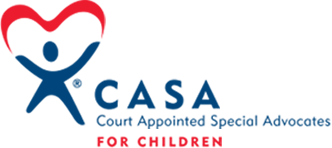September Advocate Spotlight: Ed Felman
This month, we invite you to meet CASA Advocate, Ed Felman. Thanks so much to Ed for taking the time to answer a few questions for us.
 Ed was nominated by his CASA Case Supervisor, Melissa Anderson, who shared the following about Ed and his advocacy efforts:
Ed was nominated by his CASA Case Supervisor, Melissa Anderson, who shared the following about Ed and his advocacy efforts:
“Ed became a CASA Advocate at the very beginning of 2020. For nearly 2 years, he has worked fervently to make sure things keep moving forward and that no one forgets about the teenager on his case. Ed has remained a constant source of support for this young man, even when it probably wasn’t an easy task. Because of Ed, this young man has been seen for who he is – beyond what is in the records – and has had someone standing with him when he may have otherwise felt very alone.”
How did you first hear about CASA?
I retired almost 3 years ago from a busy career with little free time and then found myself with more free time than I knew what to do with. Shortly after retiring, my wife and I moved from California to Montgomery County (which we love) and I started thinking about volunteer work. At first I looked at possibilities related to my own field but heard about CASA from someone in my neighborhood and met with the recruiting manager, Shellie, who told me about this worthwhile cause and sold me on the idea.
What attracted you to this cause?
I was very attracted to the idea of helping children who, through no fault of their own, found themselves without parents and needing a resource to help with their needs. I also was very impressed with the quality of the organization and its contribution to the community.
Did you have any reservations about becoming an Advocate?
I had great reservations about becoming an Advocate, as I wasn’t sure if I was up for the task. My wife and I do not have children and very little family, so I have no background to fall back on as far as knowing how to relate to children, particularly children who have been lacking in parental support.
Can you describe how you felt when you were sworn in?
I was very proud when I was sworn in, as I considered this an important responsibility and one where I could, hopefully, contribute to the community.
Can you describe how you felt when you took your first case?
I have had only one case since I got sworn in; a longer than normal case with a young man who was 13 when I started and had a Level of Care that prevented him from being adopted or being assigned to a foster home. For most of the time he’s been in the system, he’s been in Residential Treatment Centers (RTCs). During the 20 months I’ve known him, I’ve seen him grow and mature and his Level of Care improve and hopefully he will be adopted soon. I’ve been very proud to see his progress and have high hopes for his future. But in the meantime, he is still in the system and we have to deal with all the impediments and uncertainties that that entails.
With so many great organizations to support, why should others choose to support CASA?
CASA is a great organization and the Montgomery County chapter has amazing, inspirational people working for it. The contribution that can be made to a child’s life is real and can be immediately seen and is therefore very fulfilling.
What was the biggest challenge you have faced as a child’s Advocate?
The biggest problem I see Advocates helping to solve is trying to overcome all the impediments in the system; in particular, dealing with [CPS] caseworkers who are overworked and their offices understaffed. We’re constantly dealing with hurdles that seem to be more “red tape” than designed to address the problems these kids are facing.
What have you learned about children in foster care?
I had no idea how tough it was for them. They get trapped in a system. For the child in my case, he was in RTCs most of the time (briefly in a foster home); the RTCs are not a good environment as not only are they not a substitute for a real family, but force the child to live with other children who may be hostile. This could have the effect of bringing the child down rather than lifting him up.
How has this changed you?
The difficulties I described—both the problems dealing with CPS and the hostile environment [at the RTC] the child was put into–surprised me the most. These children are already emotionally scarred by whatever situation brought them into the child care system, then they have to deal with these issues. It has made me more aware of what a tough shake these kids have and how they need to be given an opportunity for a good life.
Is there are particular moment or memory that stands out for you?
There were times when I was extremely upset with delays to the case. It’s hard enough to find potential adoptive families interested in teenage boys; therefore when a possibility comes up, they need to be acted upon immediately. The court hearings were an opportunity to express this and to try to apply pressure to the involved parties.
Judge Tucker, the judge who oversees these cases, is an excellent judge and is very concerned with the welfare of these kids.
Is there an achievement or contribution that you are most proud of?
The achievement I’m most proud of is one that hasn’t happened yet—when the young man in my case is finally adopted into a loving home.
What do you think other people should know about CASA?
CASA of Montgomery County is an excellent organization and serves an extremely important role in helping these children in the child care system. In many ways it’s the perfect fit for someone looking for an organization to contribute time to and seeking work that is interesting and rewarding.
Is there anything else you would like to share with us?
Just that I appreciate all the people from CASA I’ve worked with. My Supervisors changed at various times but they were all great to work with.
EVERY CHILD DESERVES A CHANCE…IT’S YOU!
Learn more about becoming a CASA volunteer: VOLUNTEER or give online: DONATE.
